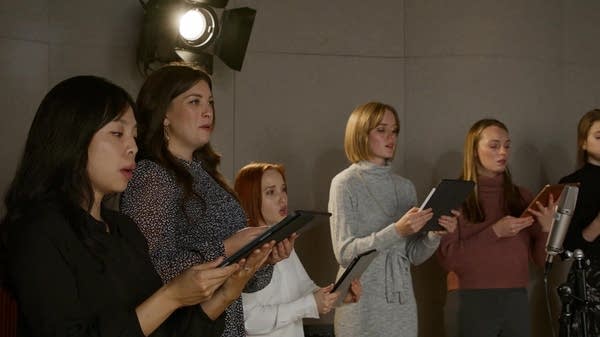Whether we call them hobbies or passions, many of us tend to keep our realms of intense interest on separate tracks.
Not Jayden Browne. He found a way to merge his enthusiasm for card games and his zeal for music theory into one enterprise. As a student at St. Olaf College in Northfield, Minn., he created Transpose, a deck of music-themed cards that can be used to turn any number of games into an impetus for understanding music theory.
Browne's ardor for card games goes back to when he was about 6. And it didn't start with the likes of Go Fish.
"My grandmother and I used to play cards whenever I went to her house," he said. "She taught me poker and gin rummy and other games."

As his zeal for such endeavors mounted, he also came to embrace music, particularly choral works. Browne started studying it in middle school, becoming a chorister in the American Boychoir. It was then that he first encountered St. Olaf choir conductor Anton Armstrong, who attended the same middle school and returned to perform there.
That's a major reason Browne ended up in Northfield, learning under a man "who has always been a major inspiration to me," he said. (His other musical favorites include Claude Debussy, Wolfgang Amadeus Mozart and jazz/pop singer Jacob Collier.) After focusing on music education throughout high school, Browne majored in music education at St. Olaf.
It was at St. Olaf several years ago when an idea that had been percolating in Browne's head started coming to fruition. The genesis was in high school, though.
"I was into music theory and helping classmates, and a lot of them used flash cards," he said.
"I thought that with slight adjustments to flash cards, I could make it like a card game. So I used index cards, and I eventually settled on these kinds of cards, but I did nothing, just thought, 'That's a cool idea.'"
Browne originally based his brainchild on the popular card game Uno.
"It has four colors, each number represented once, so I would do one card for each note," he said. "There's 12 notes in music and four different ways of representing them that I chose: letter names, piano keyboard, and treble and bass clefs. Then I added four wild cards, and that opened up all possibilities to use it like a regular deck of playing cards."
The notion sat dormant until an assignment in a writing class at St. Olaf.
"The final part of that course was to design a game and explain it to the class," he said. "Then the coronavirus hit, and for me it changed from a concept to an actual game. The plan was to write a mock Kickstarter campaign, which I thought was awesome because then, why wouldn't I make it an actual Kickstarter?"
And a campaign was born.
The target audience for Transpose, Browne said, is people who want to learn more about how music works.

"If you don't care to know music at all, it's probably not playable," he said. "This is aimed more at music people … and for card players wanting to learn about music. It's primarily for players at all levels of music theory, who have a grasp and want to play a game."
But what exactly is music theory?
Wikipedia defines it as "the study of the practices and possibilities of music." According to the website Study.com, music theory "explains what music does, and what's going on when we hear it. … It's a way to describe and explain music and how it's constructed … a means to understand the language of music."
Browne, who has studied music theory in high school and college and plays the piano, further divides the doctrine into two areas, "the written and ear training."
"Both are important," he said. "The written being how to write music and analyze music from the written page, how to identify intervals and chords and how they function together. The oral includes the ability to sight-sing [being able to read and sing music at first sight]. It isn't a necessity for musicians but is definitely helpful."
The deck's images vividly reflect the musical theme. And those who contribute to the campaign and subsequently get a set also will receive instructions for several themed variations of the game, including Out of Tune, Chromatics and Maestro.
In addition, the Transpose website "has a forum where anyone can add a game idea," Browne said. "I go through and tweak them and maybe add them to the games tab."
That's why Browne calls Transpose "a platform for many games," including not only those that teach "chord construction" or "enharmonic equivalents" but also some that are just plain fun. He hopes they are entertaining as well as edifying.
"The goal," he said, "is that hopefully people will use the deck as a tool that will make music more accessible. People talk like learning music is like learning a language. I feel like there's a lower threshold, but it's still a daunting task. If you can use something you're already familiar with like playing cards, that's great, too."
Love the music?
Show your support by making a gift to YourClassical.
Each day, we’re here for you with thoughtful streams that set the tone for your day – not to mention the stories and programs that inspire you to new discovery and help you explore the music you love.
YourClassical is available for free, because we are listener-supported public media. Take a moment to make your gift today.










